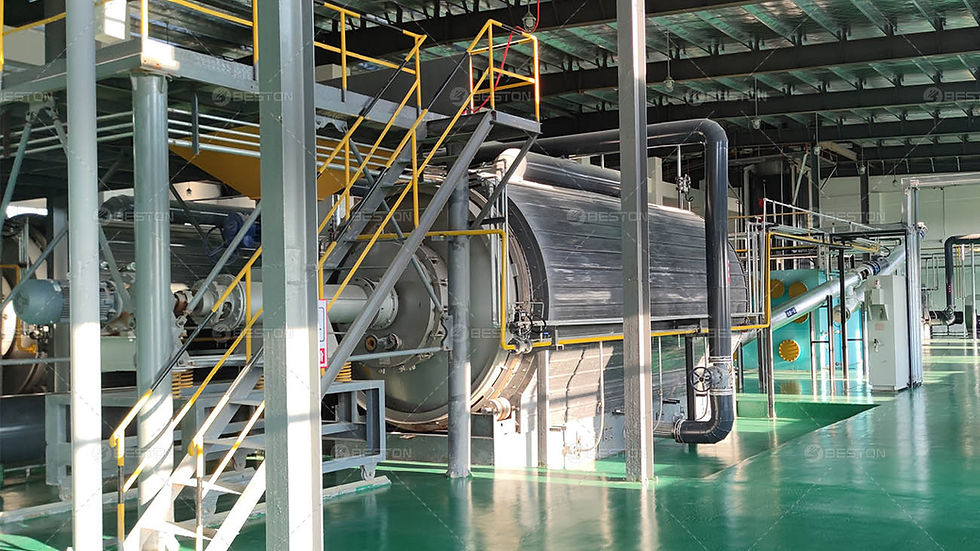Investment Prospects for Pyrolysis Plants in the UK
- Apr 8, 2024
- 3 min read
In recent years, the United Kingdom (UK) has witnessed a growing interest in sustainable waste management solutions, driven by environmental concerns and regulatory mandates. Pyrolysis plants, with their ability to convert various waste streams into valuable products, present promising investment opportunities in the UK's waste management sector.
Understanding Pyrolysis Plants
Pyrolysis plants are advanced facilities designed to thermally decompose organic materials in the absence of oxygen, producing valuable outputs such as biochar, bio-oil, and syngas. These plants play a crucial role in transforming organic waste into renewable energy sources and valuable bio-based products.
The Mechanism
At the core of pyrolysis plants lies the pyrolysis process, wherein organic feedstock undergoes decomposition under controlled temperature and pressure conditions. The absence of oxygen prevents combustion, leading to the conversion of organic matter into useful products.
Product Portfolio
Pyrolysis plants offer a diverse range of products, each with unique applications and market potential:
Biochar: A carbon-rich residue used as a soil amendment to improve soil fertility and water retention.
Bio-oil: A liquid product with applications in fuel production, chemical synthesis, and energy generation.
Syngas: A mixture of hydrogen, carbon monoxide, and methane used as a fuel source or feedstock for various industrial processes.
Investment Landscape in the UK
The UK's waste management sector is undergoing a significant transformation, driven by regulatory frameworks promoting sustainable practices and the transition towards a circular economy. Pyrolysis plants, with their ability to convert waste into valuable resources, are well-positioned to capitalize on emerging market opportunities.
Regulatory Support
The UK government has introduced policies and incentives to support investment in renewable energy and waste management technologies. Initiatives such as the Renewable Heat Incentive (RHI) and the Waste Prevention Programme provide financial incentives and regulatory support for pyrolysis plant UK operators.
Market Demand
Growing public awareness of environmental issues and increasing pressure to reduce landfill waste drive the demand for sustainable waste management solutions in the UK. Pyrolysis plants offer a viable alternative to traditional waste disposal methods, attracting interest from waste management companies, investors, and policymakers.
Technological Advancements
Advancements in pyrolysis technology, including process optimization, feedstock flexibility, and product diversification, enhance the economic viability and environmental performance of pyrolysis plants. Innovative solutions such as mobile pyrolysis units and integrated waste-to-energy systems further expand market opportunities in the UK.

Key Considerations for Investors
Investing in pyrolysis plants in the UK entails careful consideration of various factors to ensure success and maximize returns:
Feedstock Availability
The availability and quality of feedstock play a crucial role in the operational efficiency and profitability of pyrolysis plants. Investors must assess local waste streams, regulatory constraints, and logistics infrastructure to secure a reliable and cost-effective supply chain.
Market Dynamics
Understanding market dynamics, including product demand, pricing trends, and competitive landscape, is essential for informed investment decisions. Investors should conduct market research and feasibility studies to identify target markets and assess revenue potential for pyrolysis plant outputs.
Operational Efficiency
Achieving optimal operational efficiency is critical for the long-term success of pyrolysis plant investments. Factors such as plant design, technology selection, and maintenance practices influence production capacity, product quality, and overall profitability.
Regulatory Compliance
Compliance with regulatory requirements, including environmental permits, waste management licenses, and health and safety regulations, is non-negotiable for pyrolysis system operators. Investors must ensure adherence to legal frameworks and regulatory standards to mitigate risks and maintain operational continuity.
Conclusion
Investing in pyrolysis plants in the UK presents compelling opportunities to capitalize on the country's evolving waste management landscape and transition towards a circular economy. With supportive regulatory frameworks, growing market demand, and technological advancements, pyrolysis plants offer sustainable solutions for converting waste into valuable resources. However, successful investment requires careful consideration of feedstock availability, market dynamics, operational efficiency, and regulatory compliance. By addressing these key considerations, investors can harness the potential of pyrolysis technology to drive environmental sustainability, economic growth, and innovation in the UK's waste management sector.




Comments